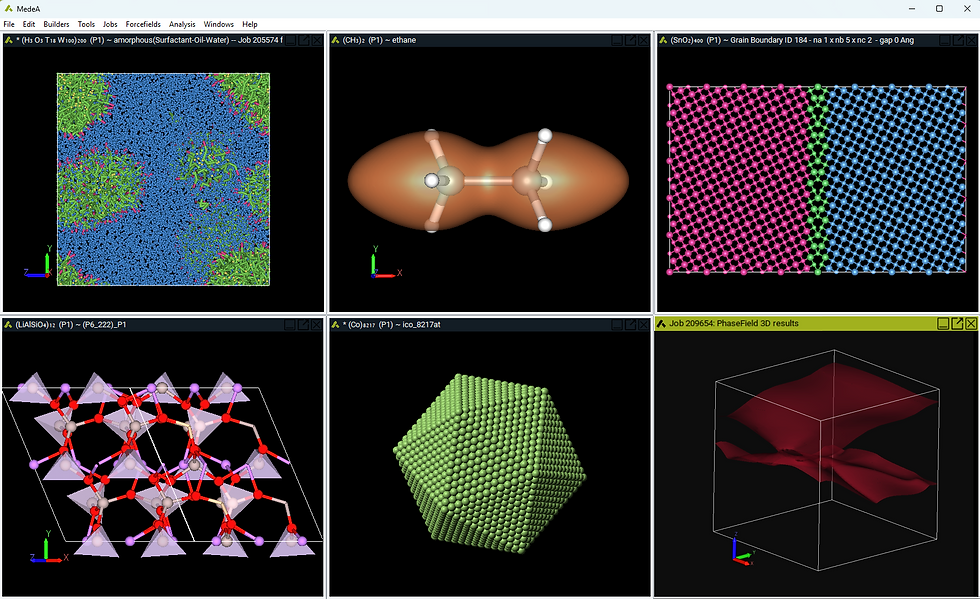MedeA Software Training at the South African CHPC National Conference 2023
- Katherine Hollingsworth
- Nov 27, 2023
- 2 min read
4-7 December 2023
Kruger National Park Skukuza Rest Camp
MedeA Software Training
4 December 2023,
David Reith, Alexander Mavromaras
Abstract
Today, a deep comprehension of the interplay between chemical reactions and physical processes is achievable through rigorous atomistic-scale simulation techniques. The Materials Design's MedeA® simulation environment [1] efficiently supports material scientists and engineers globally by offering an integrated suite of user-friendly tools. These include the leading quantum chemical and molecular mechanics solver Vienna Ab-Initio Simulation Package (VASP) [2], the forcefield-based molecular dynamics and Monte Carlo engines #LAMMPS [3] and #GIBBS [4], and the quantum chemistry codes #Gaussian [5] and #MOPAC [6]. MedeA®'s property prediction modules efficiently use these engines to compute a wide range of material properties.
To reach across length and time scales up to the mesoscale and microscale, and to explore an expansive configuration space, MedeA offers versatile multi-scale methodologies. These encompass Universal Cluster Expansion, coarse-grain potentials, and automated machine-learned potential generation.
Monday, 4 December 2023, 9:00 – 16:00
9:00 – 10:30 – Using MedeA to perform ab initio VASP calculations
1. Getting started with MedeA: Basic structure retrieval (InfomaticA) and building
2. Introduction to MedeA VASP: Setting up simple calculations with MedeA VASP
3. Hands-on: Heat of formation of SiC using PBE, meta-GGA and ACDFT-RPA
4. Speed up MD simulations using VASP’s Machine-Learned Forcefields (#MLFF)
10:30 – 12:00 – Using forcefields in MedeA to perform LAMMPS simulations
5. Introduction to MedeA LAMMPS
6. Vibrational properties using the direct method (MedeA Phonon) and from velocity autocorrelation functions using (MedeA MD #Phonon)
7. Calculating transport properties, such as thermal conductivity, and diffusion, with MedeA LAMMPS
13:30 – 15:00 – Machine Learning: Bridging the length scales from ab initio to forcefields
1. MedeA Universal Cluster Expansion (UNCLE)
2. Introduction to MedeA Machine-Learned Potential Generator (MLPG)
15:00 – 16:00 – Questions, Discussion and Wrap-up
About Materials Design:
Materials Design is the leading atomistic simulation software and services company for materials. We help customers across many diverse industries design new materials, predict their properties, and generate value through innovation.
References
[1] MedeA® - Materials Exploration and Design Analysis Software, Materials Design, Inc., Angel Fire, NM, USA 1998-2014.
[2] Vienna Ab-Initio Simulation Package (VASP), G. Kresse and J. Furthmüller, Phys. Rev. B 54, 11169 (1996).
[3] Large-scale Atomic/Molecular Massively Parallel Simulator (LAMMPS), S. Plimpton. J. Comp. Phys., 117, 1 (1995).
[4] MedeA®-Gibbs: License IFPEN-CNRS-Université Paris-Sud (2003).
[5] Gaussian 09, Revision A.02, M. J. Frisch, et al., Gaussian, Inc., Wallingford CT, 2016.
[6] Molecular Orbital PACkage (MOPAC), J. J. P. Stewart, J. Mol. Model. 13, 1173 (2007); J. Mol. Model.19, 1 (2013).
#MedeA #CHPC @NICIS_SA #hpc #CHPCConf #MachineLearning #Cloud #QuantumComputing #compchem MedeA Software Training




Comments